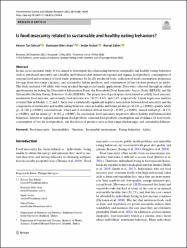| dc.contributor.author | Tarı Selçuk, Kevser | |
| dc.contributor.author | Atan, Ramazan Mert | |
| dc.contributor.author | Arslan, Sedat | |
| dc.contributor.author | Şahin, Nursel | |
| dc.date.accessioned | 2024-01-25T09:27:13Z | |
| dc.date.available | 2024-01-25T09:27:13Z | |
| dc.date.issued | 2023 | en_US |
| dc.identifier.citation | Tarı Selçuk, K., Atan, R. M., Arslan, S. ve Şahin, N. (2023). Is food insecurity related to sustainable and healthy eating behaviors? Environmental Science and Pollution Research, 30(29), 74280-74289. https://dx.doi.org/10.1007/s11356-023-27694-8 | en_US |
| dc.identifier.issn | 0944-1344 | |
| dc.identifier.issn | 1614-7499 | |
| dc.identifier.uri | https://dx.doi.org/10.1007/s11356-023-27694-8 | |
| dc.identifier.uri | https://hdl.handle.net/20.500.12511/12201 | |
| dc.description.abstract | In this cross-sectional study, it was aimed to investigate the relationship between sustainable and healthy eating behaviors such as nutritional insecurity and a healthy and balanced diet, interest in regional and organic food products, consumption of seasonal food and avoidance of food waste, preference for locally produced foods, reduction of meat consumption, preference for eggs from free-range chickens, and sustainable fishery products, and consumption of low-fat food products in adults. The study included 410 adults who were reached through social media applications. Data were collected through an online questionnaire including the Descriptive Information Form, the Household Food Insecurity Access Scale (HFIAS), and the Sustainable Healthy Eating Behaviors Scale (SHEBS). The proportion of participants determined as mildly food insecure, moderately food insecure, and severely food insecure was 10.2%, 6.6%, and 7.6%, respectively. Linear regression analysis revealed that in Models 1, 2, and 3, there was a statistically significant negative association between food insecurity and the components of sustainable and healthy eating behaviors such as healthy and balanced diet (beta - 0.226, p < 0.001), quality labels (beta - 0.230, p < 0.001), seasonal foods, which are of avoidance of food waste (beta - 0.261, p < 0.001), animal welfare (beta - 0.174, p < 0.001), and fat intake (beta - 0.181, p < 0.001). In conclusion, food insecurity negatively affects healthy and balanced diet behaviors, interest in regional and organic food products, seasonal food products consumption and avoidance of food waste, consumption of low-fat food products, and the choice of products such as free-range chicken eggs, and sustainable fisheries. | en_US |
| dc.language.iso | eng | en_US |
| dc.publisher | Springer Science and Business Media Deutschland GmbH | en_US |
| dc.rights | info:eu-repo/semantics/openAccess | en_US |
| dc.subject | Food Insecurity | en_US |
| dc.subject | Sustainability | en_US |
| dc.subject | Nutrition | en_US |
| dc.subject | Sustainable Environment | en_US |
| dc.subject | Eating Behaviors | en_US |
| dc.subject | Adults | en_US |
| dc.title | Is food insecurity related to sustainable and healthy eating behaviors? | en_US |
| dc.type | article | en_US |
| dc.relation.ispartof | Environmental Science and Pollution Research | en_US |
| dc.department | İstanbul Medipol Üniversitesi, Sağlık Bilimleri Enstitüsü, Beslenme ve Diyetetik Ana Bilim Dalı | en_US |
| dc.authorid | 0000-0003-4608-605X | en_US |
| dc.identifier.volume | 30 | en_US |
| dc.identifier.issue | 29 | en_US |
| dc.identifier.startpage | 74280 | en_US |
| dc.identifier.endpage | 74289 | en_US |
| dc.relation.publicationcategory | Makale - Uluslararası Hakemli Dergi - Kurum Öğretim Elemanı | en_US |
| dc.identifier.doi | 10.1007/s11356-023-27694-8 | en_US |
| dc.institutionauthor | Atan, Ramazan Mert | |
| dc.identifier.wosquality | Q1 | en_US |
| dc.identifier.wos | 000992741600006 | en_US |
| dc.identifier.scopus | 2-s2.0-85159662296 | en_US |
| dc.identifier.pmid | 37204579 | en_US |
| dc.identifier.scopusquality | Q1 | en_US |


















